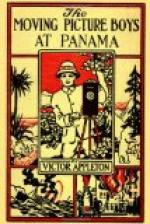That was as far as Blake read. Then he cried out:
“I say, Joe, look here! I can’t make head nor tail of this!”
“What is it?” asked his chum, looking over; his shoulder at the letter the Spaniard had so strangely brought to them.
“Why, Mr. Hadley speaks of us going to Panama. That’s the first we’ve had an inkling to that effect. What in the world does he mean?”
“I hope I have not brought you bad news in a prospective trip to where the great canal will unite the two oceans,” spoke the Spaniard in his formal manner.
“Well, I don’t know as you’d call it bad news,” said Blake, slowly. “We’ve gotten sort of used to being sent to the ends of the earth on short notice, but what gets me—excuse me for putting it that way—what surprises me is that this is the first Mr. Hadley has mentioned Panama to us.”
“Is that so?” asked Mr. Alcando. “Why, I understood that you knew all about his plans.”
“No one knows all about Hadley’s plans,” said Joe in a low voice. “He makes plans as he goes along and changes them in his sleep. But this one about Panama is sure a new one to us.”
“That’s right,” chimed in Blake.
“We were speaking of the big ditch shortly before the runaway came past,” went on Blake, “but that was only a coincidence, of course. We had no idea of going there, and I can’t yet understand what Mr. Hadley refers to when he says we may take you there with us, to show you some of the inside workings of making moving pictures.”
“Did you read the letter all the way through?” Joe asked.
“No, but—”
“Perhaps I can explain,” interrupted the Spaniard. “If you will kindly allow me. I came to New York with an express purpose in view. That purpose has now suffered—but no matter. I must not speak of that!” and there seemed to be a return of his queer, tragic manner.
“I am connected with the Equatorial Railroad Company,” he resumed, after a momentary pause, during which he seemed to regain control of himself. “Our company has recently decided to have a series of moving pictures made, showing life in our section of the South American jungle, and also what we have done in the matter of railroad transportation, to redeem the jungle, and make it more fit for habitation.
“As one of the means of interesting the public, and, I may say, in interesting capitalists, moving pictures were suggested. The idea was my own, and was adopted, and I was appointed to arrange the matter. But in order that the right kind of moving pictures might be obtained, so that they would help the work of our railroad, I decided I must know something of the details—how the pictures are made, how the cameras are constructed, how the pictures are projected—in short all I could learn about the business I desired to learn.
“My company sent me to New York, and there, on inquiry, I learned of the Film Theatrical Company. I had letters of introduction, and I soon met Mr. Hadley. He seems to be in charge of this branch of the work—I mean outdoor pictures.”




